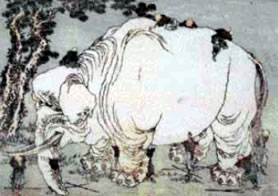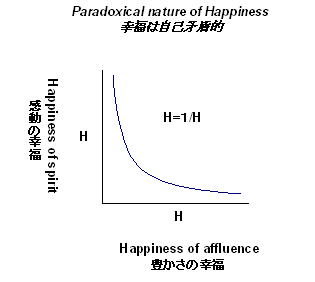Happiness: Syllabus
2008 Fall term lecture “Happiness” by Hideo. Shingu
The objective of this course is to offer a comprehensive view of “happiness” as the ultimate purpose of life. The scientific, philosophical and religious backgrounds of happiness will be presented in relation to perceptions about human nature. This series of lectures is intended to provide students of every discipline an opportunity to think about the meaning of life. It is hoped that students may reflect upon what they learned in this course when they will be engaged in serious decision making.
Course Overview
Like an elephant, happiness has such varied aspects so that your limited experience may misguide you to have a holistic notion of what it really is.

Ukiyoe depicting the examination of an elephant. By Hokusai
It is quite good to enjoy and be satisfied with things around you. But if you want to generalize your experience and to have communication with others, you must be careful if your experience can be generalized or not. There can be many different sides of an object, which you cannot understand by your limited experiences.
What we have examined in this class:
1. Four stages of happiness: 1. Increase of utility. 2. Its continuation. 3. Recovery from hardship or sorrow. 4. To see happiness even in hardship and sorrow itself.
2. Marginality of happiness: Weber-Fechner’s experiment on the logarithmic nature of our perception of the intensity of utility. To increase good feeling 2 times, stimuli must increase 4 times. St. Petersburg problem by D.Bernoulli.
3. Utilitarian happiness: The greatest happiness (utility) for the greatest number of people. Counting only contemporary population does not mean the greatest number.
4. Deborah Number: DN Everything has its relaxation time, τ. The ratio of relaxation time vs. time of observation, t is DN (= τ/ t). τof human life is ca.50years. τfor human species is 1,000,000 years? We should worry about our happiness in the time range DN<1. Note that 50 years can be forever and an instant. It is true for a million years.
5. Universe in which we live: Space, Time and Material (energy). Space-Time composes a four dimensional world. What are contained in such world are ourselves and things around us.
6. Pascal’s Wager: The choice one should take when there is an alternative possibility. Pascal said, to bet on the non-existence of God is too risky. This wager may be better applied to the choice between a life without discretion seeking money and a happy proud life without money.
7. Nothing is absolute: Joy cannot exist alone. If there is no sorrow there is no joy. Happiness exists because there is unhappiness? Can you hear the sound of one handed clap (Zen Buddhist Hakuin’s riddle)?
8. Imaginable happiness and unimaginable happiness:
Joy and pleasure are easy to image. Sorrow and hardship are often beyond imagination. [All happy families resemble one another, but each unhappy family is unhappy in its own way.] Anna Karenina by Leo Tolstoy (Russian novelist, 1828-1906). Do you prefer to be equal with majority or to be different from others? Do you understand the phrase: [Sorrow is better than laughter (Old Testament: Qohelet)]? The following phrase is: [for by the sadness of face the heart is made good].
9. Stories of satisfied persons do not move the hearts of listeners:
What do you do when you have become happy? Elimination of purpose may bring misery?.
10. Happiness is : Both individualistic and universal. Both nominal and real.
11. Evil has its role for the achievement of happiness? :
Evil exists in the world not to create despair, but activity. It is not only the interest but the duty of every individual to use his utmost efforts to remove evil from himself and from as large a circle as he can influence (by doing so) he will probably improve and exalt his own mind. (Malthus 1798).
12. Primum vivere deinde philosophari:We have to live before being happy. Importance of natural environment preservation.

Although wishing to be rid of misery,
They run toward misery itself.
Although wishing to have happiness,
Like an enemy they ignorantly destroy it.
Santideva, "Bodhicaryavatara"(寂天、入菩提行論)
Written by Shingu : November 1, 2007 04:11 PM